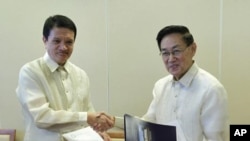Philippine negotiators sat down with communist rebel leaders for the first time in six years Tuesday for peace talks that were overshadowed by the arrest of a rebel leader.
The week-long talks are being held in a suburb of the Norwegian capital Oslo.
At the start of the talks, both sides expressed hope for progress in ending an insurgency that has spanned four decades and claimed tens of thousands of lives.
But the rebels' chief negotiator, Luis Jalandoni, alleged that the arrest Monday of Alan Jazmines was an attempt by security forces to disrupt the talks. He said Jazmines, a member of the Communist Party of the Philippines central committee, must be "released immediately and unconditionally so there will be no disruption of the formal peace talks."
Jazmines, who was captured Monday in a village north of Manila, faces charges of rebellion and murder.
The rebels agreed on January 18 to the current talks with the government of President Benigno Aquino, who came into office last year. But less than a week later, the rebels killed five policemen in a well-planned ambush in the northern Philippines.
Communist insurgents in the Philippines remain a powerful force and have prevented the central government from exercising control over large parts of the country.
The Brussels-based International Crisis Group calls the Oslo talks the best hope in years for ending hostilities. But other are skeptical that either side in interested in seriously negotiating.
"These talks will drag on for some time and there will be headlines now and again," says Gerard Finin, a senior fellow at the Hawaii-based East-West Center. But he adds, "I would be very surprised if they lead to any significant results."
Previous talks between the rebels and the Philippine government of President Gloria Arroyo broke down in 2004 after the CPP and its armed wing, the New People's Army, were added to U.S. and European Union lists of terrorist organizations.
Listen to more of Gerald Finan's interview with VOA's Victor Beattie
Some information for this report was provided by AP, AFP and Reuters.




